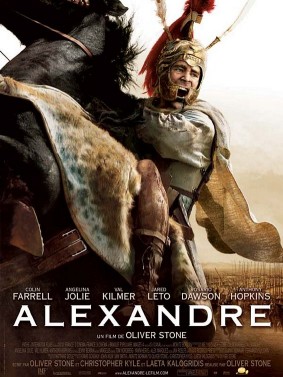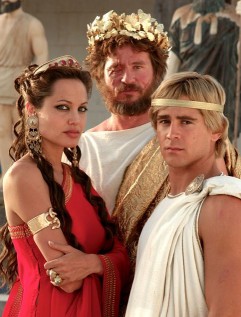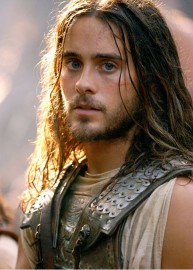|
Alexander
Alexander
has been left to stew in my brain ever since the credits
rolled at the screening the other night and now it has come
time to put it down, quite literally.
This
is one of those troublesome situations that rears its ugly
head every so often. A director who has a fifty-fifty track
record in my book has put something down on film that not
only looks and smells like it should be admired, even treasured,
yet in the end the whole concoction comes up empty.
The
fact that Alexander packs blanks is not really
surprising. The hype machine started in early enough when
both Wolfgang Peterson’s troublesome Troy
and Stone’s epic were slated for production that anyone
should have seen the writing on the wall. As
time went by though, more and more Alexander seemed
to be pegged to become an Oscar giant, but something just
never seemed to add up.
After
screening the film I’m convinced that this is the
case. The response from the weary audience in attendance
was that of fatigue. It connected with someone, because
a few claps were heard, but the majority of the crowd shuffled
out in a daze with an “it was okay” look about
them.
Will
the film kill Thanksgiving Week? Sure, why not? Stuff like
this always does, but it seems doubtful that it will have
legs enough to make a serious grab at becoming the stuff
of legend. Let’s face it, isn’t that what we
would all expect from a film focusing on someone named “Alexander
the Great?”
From
the beginning, it feels as though it will deliver, too,
as Alexander is depicted as a child torn between his devotion
to his mother, a snake wielding Olympias (Angelina Jolie),
and his desire to please his father, Philip of Macedonia
(Val Kilmer).
His
ambition to please and excel is adequately displayed, and
instead of skirting all references to the gods of Greek
Mythology as Peterson did with Troy, Stone delves
right into the thick of the mythos while surprisingly pulling
off this motivation without oversaturating the film in spiritual
meanderings.
The
film is also not the “battle fest” many may
be anticipating, and this is what I was weary of going in,
just another film chock full of outrageously over the top
computer generated battles. How many times can we see CG
campaigns carried out in gory brutality?
Instead
the film spends more time focusing on Alexander’s
admiration of the gods and setting up his eventual downfall.
Imagine my surprise, a film that circumvents the opportunity
to relish in scene after scene of violence in favor for
time spent developing character, and yet it still disappoints!
Surprisingly,
it’s the battles in Alexander that provide
a breath of fresh air. After growing weary of yet another
digitally rendered battalion battling their foes in what
resembles a video game cut scene, it’s refreshing
to see that Stone has successfully crafted combat scenes
that utilize digital effects, yet manage to blend so seamlessly
with live footage that we are given a truly organic feel
to the whole thing. Sure,
the walls of Babylon border on the crisp textures found
in the Star Wars prequels, but overall these effects mesh
in almost perfect union.
Truth
is, the hindrances come in the form of droll presentation.
The film is beautifully lensed, to the credit of Rodrigo
Prieto, but the balance falls short on the story side despite
there being a wealth to pull from. Despite successfully
addressing the usual host of problems that plague epics
such as these, somewhere along the way the heart and soul
get lost in the 173 minute runtime.
That’s
right, seven minutes short of three full hours, and yet
it feels like an eternity. Stone takes the historical angle
here, and it’s not really unexpected, yet the wry
tone feels a bit like a lecture at times.
So what
about the dirt? You know, is the love interest between Alexander
and Hephaistion (Jared Leto) developed or ignored?
It is
present, although these scenes are hardly the scandal they’ve
been made out to be. In fact they provide the most entertaining
developments within the film. Stone does well to introduce
these tidbits steadily, from implications at an early age
to a complete declaration of love and the reciprocation
of said feelings, but the urgency of retreat from such developments
is felt in the process.
Just
as things are primed to dive deeper into potential conflict,
these motivations seem to be jarringly abandoned and almost
completely ignored until the film’s climax. We jump
back in time to witness events that had been leapfrogged
in Ptolemy’s (Anthony Hopkins) early narration, seemingly
to truncate events in favor of a shorter runtime.
Flashing
back is what makes the tedium set in further, as not only
was an end to the film in sight, but the visualizing events
already explained feels redundant despite the hope for dramatic
payoff. One can see why this was implemented, but it was
unnecessary as the developments revealed in flashback felt
implied by Olympias’ devotion to her son.
Forget
the Oscar buzz that began brewing earlier this fall, because
if this film manages to scrape a few nods in its favor they
will likely be for performances, not for the overall film
itself. Most of the appearances here are fairly strong,
and both Farrell and Kilmer stand out enough to catch the
eye of a few Academy members.
Aside
from these two instances, the rest of the film is hardly
the goliath it had been talked up to be and it is most certainly
not “great,” which could tell why such declaration
was omitted from the title of the film altogether.
Rating:

|








